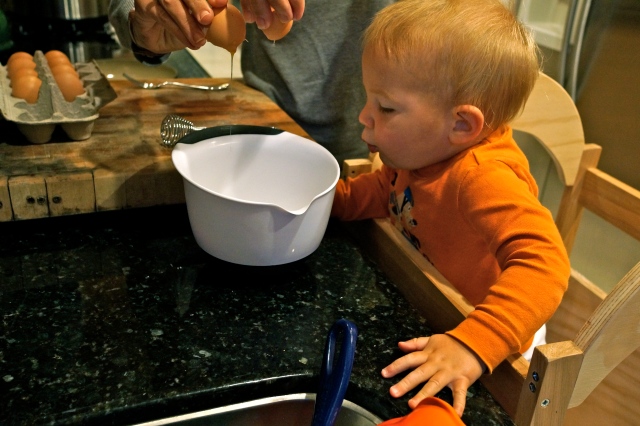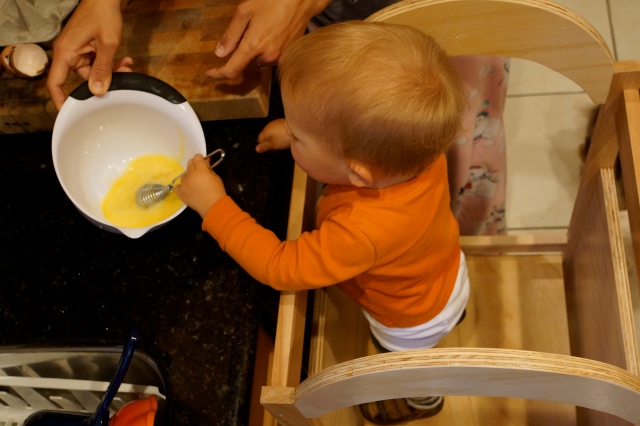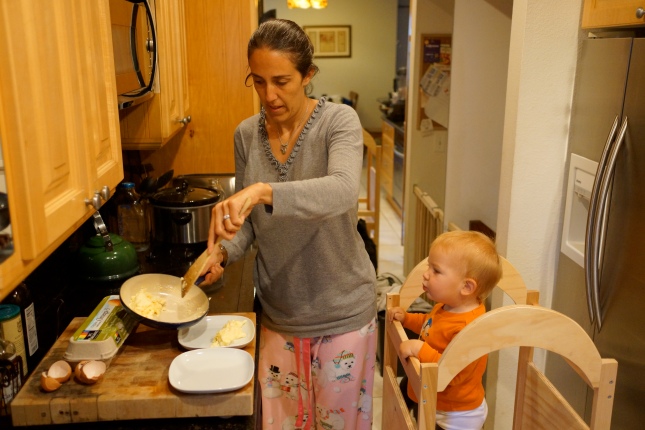The Zen of Cooking with Toddlers
You know that useless, in-the-way feeling you get when you’re a guest at someone's house and they won't let you help? I've always wondered if that's how young children feel in their own homes when we exclude them from practical tasks. We buy them little kitchens, wooden food items, and plastic tea sets, but perhaps what they really want is to participate in our daily activities!
Case in point: One day, around the time of his first birthday, Zach began screaming and pulling at my pant leg while I was cooking. To avoid ending up with my pants around my ankles, I threw on a sling and popped him on my hip. I went back to my work and the crying immediately stopped.
At first I thought this was because he had gotten what he wanted: to be carried. But then I noticed that he was intensely focused on the chopped vegetables I was transferring to a pot. His eyes followed my hand as it moved from the chopping board to the pressure cooker and back.
I leaned in over the chopping board and told him to grab some chard. He took a small amount in his chubby fist and I moved over to the stove. I held my hand under his arm so he wouldn't accidentally burn himself on the pot and he dropped in the vegetables. We repeated the procedure a dozen times, until we eventually ran out of chard, which led to a cry of protest on his part.
We've repeated this transferring activity a few times since that day. This is a messy process since many veggies miss their intended target, but his engagement and concentration make the clean-up worthwhile.
However, I knew that he couldn't possibly associate what he tossed in the pot at 3pm with what he ate for dinner three hours later. I wanted him to experience an entire cycle, from prepping to cooking to eating.
Recently, my husband and sister-in-law made a Learning Tower for Zach. They used this tutorial, but you can also buy a pre-built tower online. I also ordered a few items from For Small Hands, among them a child-sized mixing bowl and whisk.
I told my 14-month old that he would be helping me to make scrambled eggs for breakfast. I put him in the tower, helped him wash his hands, and set out the necessary tools and ingredients. I stood to his right side and cracked three eggs into the bowl, making sure my movements were slow and methodical, so he could absorb each step.

I started whisking the eggs while holding the bowl, and then offered the whisk to Zach. He immediately caught on and began imitating my movements with surprisingly little mess. I kept one hand on the bowl and tipped it slightly in his direction so he could see the contents. At one point, he gingerly put his fingers into the bowl. I thought he might start making a mess, but he just felt around for a few seconds and pulled out his hand.

While we worked, the oil was heating up in the pan. I showed Zach how to season the eggs, then moved his tower close to the stove (but at a safe distance to avoid any oil splatter from reaching him). He watched attentively as I poured the eggs into the pan.

The first time we did this activity, he started screaming as soon as he realized the eggs scrambling in the pan were his breakfast - he wanted to eat NOW! I talked him through the waiting process, knowing that he needed to experience the entire cycle. When we cooked together again a few mornings later, he was able to maintain his composure until the eggs were ready. Parents always want to know how they can "do Montessori" at home.
One word: COOK.

PS: For more inspiration, check out Home Grown Montessori's post on cooking with children. This amazing momma/Montessori guide (and good friend) involves her children in just about every household activity, with beautiful results!
Case in point: One day, around the time of his first birthday, Zach began screaming and pulling at my pant leg while I was cooking. To avoid ending up with my pants around my ankles, I threw on a sling and popped him on my hip. I went back to my work and the crying immediately stopped.
At first I thought this was because he had gotten what he wanted: to be carried. But then I noticed that he was intensely focused on the chopped vegetables I was transferring to a pot. His eyes followed my hand as it moved from the chopping board to the pressure cooker and back.
I leaned in over the chopping board and told him to grab some chard. He took a small amount in his chubby fist and I moved over to the stove. I held my hand under his arm so he wouldn't accidentally burn himself on the pot and he dropped in the vegetables. We repeated the procedure a dozen times, until we eventually ran out of chard, which led to a cry of protest on his part.
We've repeated this transferring activity a few times since that day. This is a messy process since many veggies miss their intended target, but his engagement and concentration make the clean-up worthwhile.
However, I knew that he couldn't possibly associate what he tossed in the pot at 3pm with what he ate for dinner three hours later. I wanted him to experience an entire cycle, from prepping to cooking to eating.
Recently, my husband and sister-in-law made a Learning Tower for Zach. They used this tutorial, but you can also buy a pre-built tower online. I also ordered a few items from For Small Hands, among them a child-sized mixing bowl and whisk.
I told my 14-month old that he would be helping me to make scrambled eggs for breakfast. I put him in the tower, helped him wash his hands, and set out the necessary tools and ingredients. I stood to his right side and cracked three eggs into the bowl, making sure my movements were slow and methodical, so he could absorb each step.

I started whisking the eggs while holding the bowl, and then offered the whisk to Zach. He immediately caught on and began imitating my movements with surprisingly little mess. I kept one hand on the bowl and tipped it slightly in his direction so he could see the contents. At one point, he gingerly put his fingers into the bowl. I thought he might start making a mess, but he just felt around for a few seconds and pulled out his hand.

While we worked, the oil was heating up in the pan. I showed Zach how to season the eggs, then moved his tower close to the stove (but at a safe distance to avoid any oil splatter from reaching him). He watched attentively as I poured the eggs into the pan.

The first time we did this activity, he started screaming as soon as he realized the eggs scrambling in the pan were his breakfast - he wanted to eat NOW! I talked him through the waiting process, knowing that he needed to experience the entire cycle. When we cooked together again a few mornings later, he was able to maintain his composure until the eggs were ready. Parents always want to know how they can "do Montessori" at home.
One word: COOK.

PS: For more inspiration, check out Home Grown Montessori's post on cooking with children. This amazing momma/Montessori guide (and good friend) involves her children in just about every household activity, with beautiful results!
Categories
- 3-6 (8)
- 6-9 (26)
- 9-12 (8)
- Positive Discipline (2)
- Conscious Parenting (12)
- Montessori Curriculum (9)
- Preparation of the Adult (14)
- Preparation of the Environment (11)
- Montessori Principles (11)
- Montessori Homeschooling (20)
- Language Arts (3)
- Math (3)
- Geography (2)
- Biology (1)
- History (2)
- Practical Life (1)
- Montessori Stories (4)


2 comments
Leave a comment